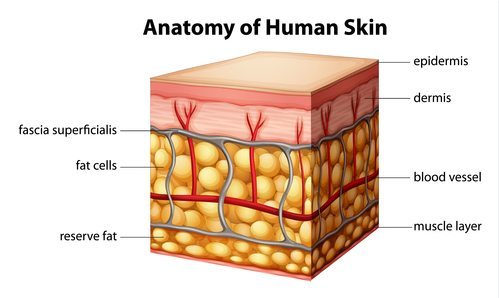Your skin is amazing. It is the largest organ in your body, and it grows with you from birth to adulthood. It allows you to feel a wide range of sensations, and it protects you from a variety of harm. In addition to providing protection from physical damage, your skin also helps keep out germs and bacteria. It triggers your immune system when germs do manage to make their way through your skin. Plus, skin helps regulate your body temperature and it synthesizes chemicals (like Vitamin D) that provide your body with the nutrients it needs. Learning how skin works will help you protect and care for it, no matter what your age.
How Skin Works
Your skin is made up of three layers: the epidermis, the dermis, and the hypodermis. These layers work together and support each other. To learn how skin works, you must understand the purpose of each of the following layers:
- The epidermis is the outer layer of skin. It contains melanin, which gives your skin color and protects against infections.
- The next layer is the dermis, which is where blood vessels are located. It’s also where you find collagen (which supports your epidermis) as well as sweat glands, hair follicles, and nerve endings.
- The final and deepest layer of skin is the hypodermis. This layer of skin connects to muscle and bone, and it is made of subcutaneous tissue, which provides insulation and helps control the body’s temperature.
A Little TLC
Although your skin is tough and can withstand a lot of damage, it’s important that you give it all the help you can. When skin is in poor condition, it will have a hard time doing its many jobs. Skin that is not properly nourished, hydrated, and protected may become dry, itchy, painful, and easily damaged. Every 27 days or so, your skin will regenerate itself. This means that it won’t take long to see dramatic improvements when you start caring for your skin.
However, it’s important to note that some damage may not be healed in just a month’s time. For example, spending too much time in the sun or smoking can permanently damage the collagen you currently have and reduce collagen production. Collagen supports your skin. When your collagen levels drop, your skin will begin to sag and can form wrinkles. Collagen damage may not be replaced when your skin regenerates.
Proper Skin Care
Although it’s best to start caring for your skin early in life, it’s never too late to start. Your main focus should be keeping your skin hydrated, nourished, and protected.
Hydration involves making sure that you drink enough water, and minimize your intake of soda or sugary drinks because they can dehydrate you. In addition, use a daily moisturizer to hydrate your skin after cleansing. Nourishing your skin means eating right, although some nutrients can be delivered with oils, serums, and lotions. Your skin needs beta-carotene, vitamins C and E, and antioxidants, amongst other nutrients. Finally, protecting your skin means staying out of the sun and making sure you’re properly covered when you do go out. In addition to using sunblock, you need to make sure that you’re selecting an SPF that offers broad spectrum (both UVA & UVB) protection for your climate.
Knowing how skin works can help you protect and take care of your body. Create a solid skin care regimen to handle problems proactively, improve your overall health, and maintain a youthful appearance.
Getting Started
Whether you’re concerned about age spots, acne, wrinkles, dullness, or a specific condition like milia, a cholesterol deposit, or Actinic Keratosis, most people would like to change certain things about their skin. And if you don’t, you probably wish you could protect your skin’s current condition. For help with proactive and reactive skin treatments, contact DermaHealth. Our consultants can help you decide which services and products will work best for your concerns during a free consultation. To learn more, please give us a call at 417-447-7777 or click here to schedule a free consultation. We look forward to hearing from you!







